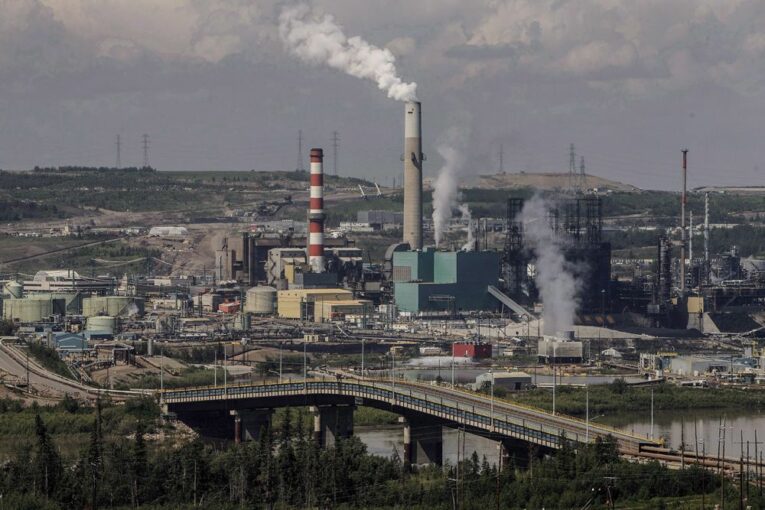
Look who’s coming to dinner.
For Alberta’s energy sector, U.S. Sen. Joe Manchin will be heading to the province on Monday and Tuesday to visit oilsands operations near Fort McMurray.
He is also expected to attend a North American energy roundtable meeting in Calgary with leaders of some of the country’s largest petroleum producers and pipeline operators.
As concerns about global energy security continue to boil, the chair of the powerful U.S. Senate committee on energy and natural resources — and a key swing vote in the Senate — will tour an oilsands mine and thermal oilsands facility with Premier Jason Kenney and Energy Minister Sonya Savage.
The visit came about after the three politicians spoke by phone last month and discussed energy security and the need for a continental strategy.
“He mentioned he’d like to come up and see the oilsands, see how they do things up here, have a tour, understand the processes and understand the potential,” Savage said in an interview Friday.
“This is huge. This is the United States paying attention to energy security, it’s the United States looking north for a solution to the high price at the pumps.”
Manchin will arrive as both natural gas and oil prices are surging, with benchmark U.S. crude rates up by 30 per cent this year.
Over the past month, both the American and Canadian governments have asked domestic petroleum producers to increase output following Russia’s invasion of Ukraine, while the U.S. is releasing crude from its Strategic Petroleum Reserve.
South of the border, conversations that have been dormant for years about the security of supply are being revived, said Ben Cahill, senior fellow on energy security at the Centre for Strategic and International Studies, a Washington-based think tank.
Manchin’s trip is “a symbol that we need to think about oil and gas as part of energy security and economic security,” Cahill said Friday.
“Going to our closest neighbour and trade partner is a sign that Canada can be part of the solution for the U.S.”
Industry leaders in Canada say getting Manchin to visit the oilsands, with the world’s fourth-largest proven oil reserves, is significant after the U.S. banned Russian oil imports and is looking to secure additional supplies.
“We’re in uncharted waters today and looking at the dynamics in the United States. They have record-high gasoline prices,” said Tim McMillan, CEO of the Canadian Association of Petroleum Producers.
“They’ve been sending envoys (from) the administration to the Middle East and to Venezuela to look at how they could increase production. Joe Manchin’s visit to Alberta starts to reinforce what is probably the most logical, the most economic and the most secure form of oil for the U.S. driving public.”
Officials in Manchin’s office declined to comment on the trip.
It’s expected Kenney, Savage and Manchin will discuss North American energy integration issues. Alberta’s energy minister also hopes to talk about critical minerals and the potential to develop them in the province and become a key supplier in North America.
Inevitably, they will also discuss the failed Keystone XL cross-border oil pipeline, which was cancelled by U.S. President Joe Biden last year.
The Kenney government invested directly in the project, which was led by Calgary-based TC Energy, and has since pegged its financial losses at $1.3 billion.
The Democratic senator from West Virginia has backed Keystone XL, putting him at odds with the progressive wing of his own party and the president.
“We should have built that pipeline,” Manchin told Fox TV last month. “I still think we should build that pipeline and have that product coming from Canada, our best and friendliest neighbour.”
That’s a message that resonates with Kenney.
The likelihood of resurrecting KXL seems minuscule, however, given the political polarization surrounding the project and Biden’s cancelling of its permits over climate concerns and greenhouse gas emissions from the oilsands.
And TC Energy CEO Francois Poirier appears to have as much interest in resuscitating the pipeline — first proposed in 2008 — as getting poison ivy.
“On Keystone XL, we’ve turned the page and we’re not interested in reviving that,” Poirier said Wednesday at an investment forum.
“And I don’t think President Biden is interested in reviving that either, based on recent comments he made publicly. We’ve moved on.”
However, Keystone XL doesn’t need to dominate the discussion.
There are other pipelines, smaller projects and other infrastructure that can bolster energy trade between the countries. Battles over the Line 3 and Line 5 projects are also continuing.
In January, Canada shipped almost 4.6 million barrels per day of oil and other petroleum products into the U.S., about 56 per cent of all imports. And the U.S. supplied two-thirds of Canada’s oil imports last year.
Industry expert Greg Stringham, CAPP’s former vice-president of oilsands, has met several times with the veteran senator and noted Canadian officials have been trying for years to get Manchin north to see the oilsands.
“This is a really strong signal that he’s trying to accelerate the understanding of Canada-U.S. energy relations from his perceptive within his own party,” Stringham said.
The challenge for Canada is ensuring additional exports of oil are from lower-emissions barrels, said Cahill, noting there’s little awareness in the U.S. of what Canadian producers are doing to reduce the carbon intensity from the oilsands.
On the flip side, there is a new opportunity to talk about increasing oil and gas shipments from Alberta.
“The whole U.S. has been jolted into thinking about energy security again,” Cahill said.
“It’s created more openness to importing more volumes from Canada. It’s kind of opened up new possibilities.”
Chris Varcoe is a Calgary Herald columnist.
You can read more of the news on source
